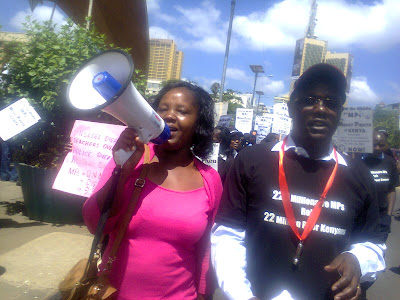 |
| Activists demonstrate against the MPs in Nairobi |
Civil Society Organizations have twice this week of January 15-17, 2013 staged peaceful demonstrations in Kenya's capital Nairobi protesting over recent attempts by outgoing members of the country's parliament to sneak in generous retirement perks as they end their term.
The move, coming barely two months ahead of the next General Elections due on March 4, 2013 is bound to hit the out going legislators hard and a majority are unlikely to get re-elected.
CSOs and other Kenyans have expressed outrage over the move, which President Kibaki has shot down by refusing to assent to the Bill passed in the last session of parliament by the fatigued MPs, who were however still awake enough to think about their personal interests.
During the demonstrations in the capital, the hundreds of members of the activists donning black T-shirts and carrying placards and coffins, expressed outrage that the outgoing MPs could so shamelessly seek to award themselves generous send-off perks when a majority of Kenyans continued to suffer hunger and insecurity stalked the nation ahead of the elections.
The MPs sought to award themselves about Kshs 10 Million (about 110,000 US dollars) as a lump sum send off package besides other benefits which included monthly payments, security and state funeral upon death! Outraged Kenyans have come out fighting and are likely to vote out most of them at the March 4 Elections.
 |
| The message is loud and clear |
In the first day of the demonstrations, the demonstrators went to parliament after going through several streets, where they tied an effigy of the MPs and "hanged" him at the the gate to the August House. Rev. Timothy Njoya, a re-known democracy and human rights crusader, said a prayer for the effigy before it was "hanged" and before the group presented a petition to President Mwai Kibaki.
 |
| A demonstrator drags one of coffins towards Parliament |
In the second day of demonstration on January 16, 2013, the activists paraded over 200 wooden coffins which they used to do a mock "state burial" for the MPs in a ceremony that took them through various streets and eventually set the coffins on fire next to Parliament.
The passage of a new constitution in August 2010 and the ongoing implementation have energized Kenyans to fight bad governance.
The Constitution, hailed as one of the most progressive in the world, has a strong Bill of Rights which has emboldened the citizens, leading to an increasing robust expression of public discontent with government and public officers' excesses.
 |
| Those who have ears should hear, those with eyes should see! |
Scenes like this are likely to be common place among Kenyans, not only in Nairobi but also in other regional towns given that the anger against the outgoing legislators is wisespread.
Many of them have already come under a lot of pressure from an increasingly enlightened citizenry some of who have taken them to court for misuse of devolved funds.















